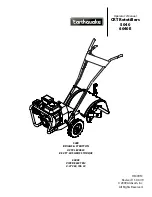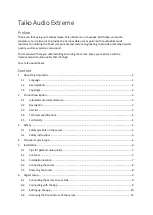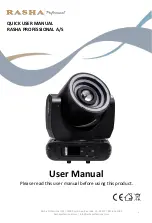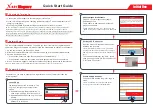
LISST-SL V2.1
User’s Guide
11
III.
Learning the LISST-SL System
1. Basics
2. The B-Reel
Cable termination
3. Topside
Control Box
(TCB)
Main menu
In Chapter I, we described the LISST-SL sensor and
familiarized you with the component systems that are
visible. To refresh, the LISST-SL sensor, whenever
powered, immediately begins to adjust the internal pump
to iso-kinetic operation and starts transmitting data. Iso-
kinetic means when water is taken into the LISST-SL at a
velocity matching the river velocity. The power source is
in the TCB, and data are managed by the (TCB) also,
which has a touch-screen display.
For the purposes of this manual, we will assume that the
user has a bridge-top cart to which the B-reel would be
mounted. The user will also need to locate a place to
position the Topside Control Box.
LISST-SL Sensor:
The LISST-SL is shipped to you with caps on the intake
and pitot tube openings, and on the underwater
connector
.
Remove all for use, but keep them covered
when in storage. A flexible tube is also attached to the
water exit end. Leave this as is. It will be used for
acquiring the in-situ Background file.
B-Reel:
Recall from Chapter I that the B-reel is a battery-powered
or manually operated winch, with a strong steel cable.
The cable has a conductor at center which makes the
cable a 2-conductor wire. The free end of the cable is
terminated to connect to the lifting point and to the
electrical connector on the LISST-SL. For quick tests, it is
not essential to have the B-reel between the LISST-SL
and the TCB. A short cable is provided so that you may
directly connect the LISST-SL to the TCB.
The electrical termination of the steel cable should
always be protected from shorts. If you did not purchase
the B-reel from Sequoia, you will need to terminate the
free end of the steel cable. The pin-outs for wiring are in
Appendix F.
The Topside Control Box (TCB):
In order to make the LISST-SL user-friendly and self-
contained, i.e. not needing a computer, the TCB was
developed. It encloses the battery and the computer that
responds to the touch-screen commands, controls the
display, and also stores data. An intuitive menu-driven
interface has been created. When the power switch is
















































